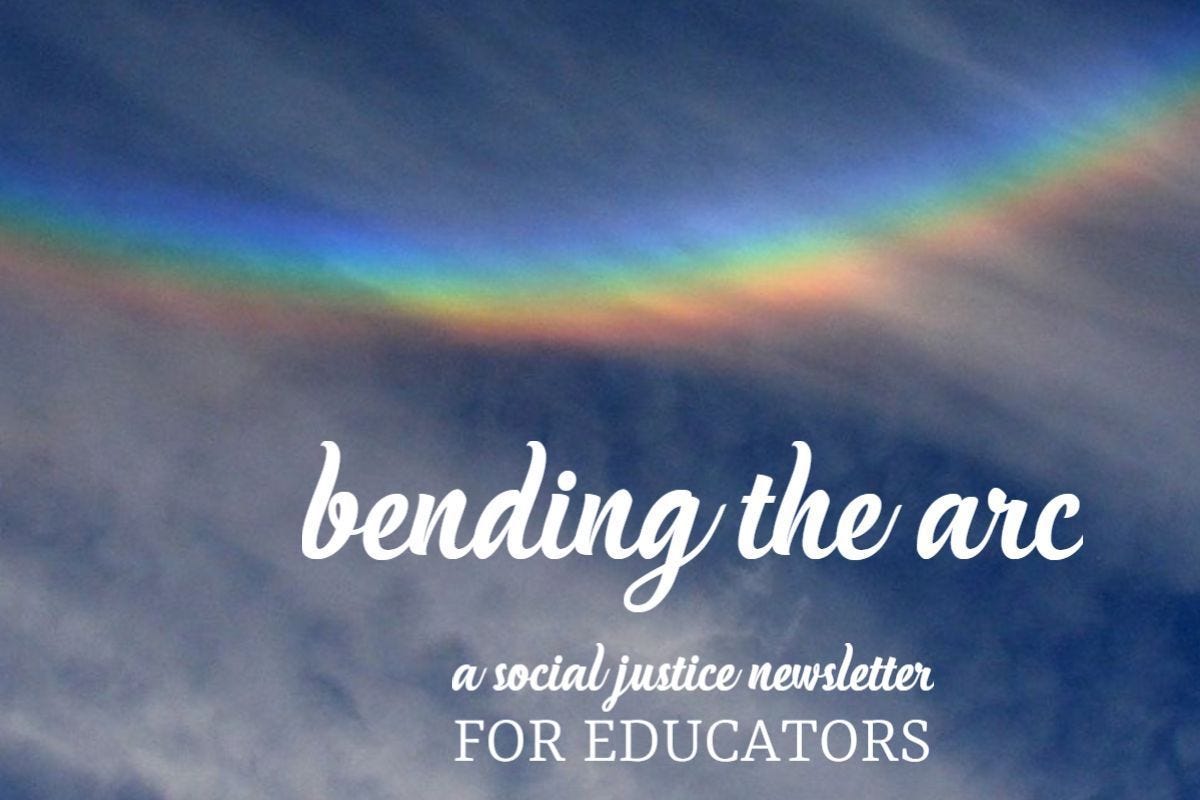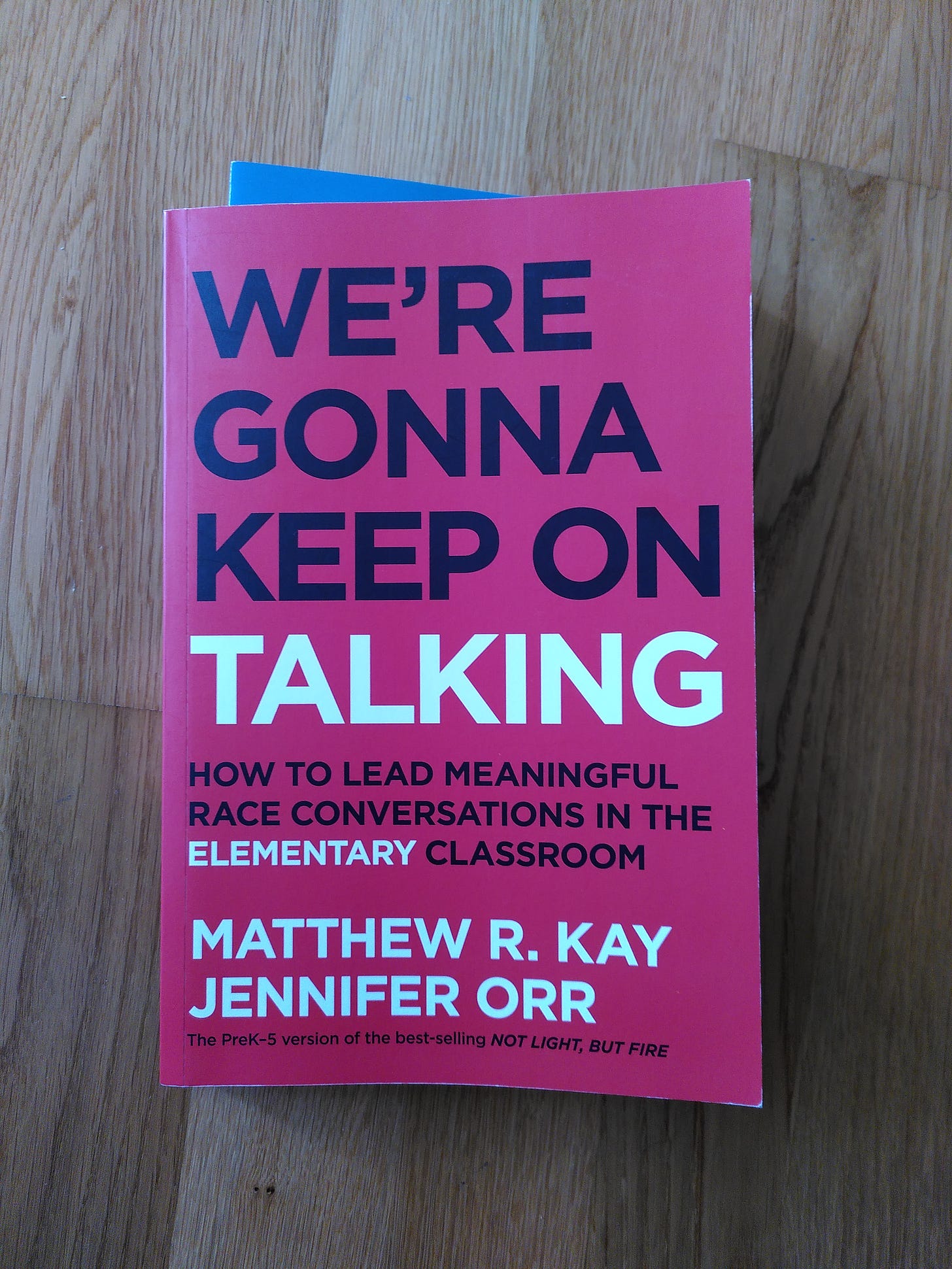And we’re off…
Buckle up, friends, this might be a long one.
Of course the beginning of the school year gives us multiple opportunities to think about how we are welcoming students and each other into a new season of learning. Beyond that, we have the luxury of a fresh start. Even if we’re returning for our 2nd or 20th year, the prospect of novelty of one kind or another is bound to present itself.
This month I offer you a mix of topics: celebrating equitably, early years race talk and critical AI resources. It’s quite a range and also acknowledges the variety of themes we need to consider in our school community. Not every topic has the same relevance for each person. Yes, and. In order to work towards equity and justice in our contexts, we have to practice observing broadly, looking at concerns that seem distant yet impact our students, colleagues, and loved ones in ways we may or may not be conscious of.
What I’ve learned over the last several years is that DEIJ is neither easy nor convenient to package, despite the market’s urge to demonstrate otherwise. Injustices surround us; they are pervasive, unwieldy, multi-pronged and enduring. Our approaches to counter them need to be far more transparent in acknowledging that fundamental truth. It is in that spirit that these missives keep shifting in form and substance. A color coded and neatly themed presentation of the realities at hand are not my ministry. Thank you for appreciating that and bearing with me.
Early Years Race Talk
One article I read this summer, “Hard Conversations: Curiosity, Courage, Connections” by Loretta Fernando-Smith really hit home because it described the challenge of discussing race with young children. For me as a rare Black teacher to mostly white children and as the parent of two racially mixed sons, this brief meditation on a race conversation in her kindergarten space affirmed and bolstered my thinking on the topic. Fernando-Smith is an early years teacher in Frankfurt, Germany.
“Adults can help children develop positive attitudes about race and diversity and they can cultivate skills and attributes that promote an equitable, just future but . . . only if we talk honestly and openly. I am frustrated that as adults we do not see the urgency to do better. That we continue to center our comfort.” - Loretta Fernando-Smith
As a companion resource, it feels important to boost again We’re Gonna Keep On Talking by Matthew Kay and Jennifer Orr. I described the book in the August newsletter and I’m coming back to it because I am convinced that Kay and Orr are offering the type of hands-on guidance that many teachers are seeking when it comes to discussing race and other identity-specific topics with elementary students.
Jennifer Orr is a classroom teacher with decades of experience with all levels of elementary students. I particularly enjoyed reading descriptions of student dialogue in wrestling with identity topics. In the early years Orr walks us through a series of exchanges around students’ names and their stories. She presents the highlights as well as the challenges in having students investigate something as personal as how they were named. She also provides an example of how her group learns to talk about skin tones. If you’ve ever spent time in an early childhood classroom, you will immediately recognize the authenticity of the conversations shared.
In the introduction, Orr makes a point similar to Fernando-Smith that bears reiteration:
“In the end, I teach young children. They are observant and they are curious. They are full of questions and frequently aware of when we, the adults in their lives are avoiding certain conversations. We can tell ourselves that avoiding the topic of race is a way of staying neutral, of not taking a stance. However, our students are aware of this avoidance, and they do not see it as neutral. they see the importance of their questions, and we must do the same.” (p. 6)
Celebrating Equitably!
September and the race is on! The 9-month sprint we call a school year is already picking up speed. It also means that the first school-wide celebrations are lined up and unfolding week after week. Given that, it makes sense to consider a few points to ensure that our big and small community events foster inclusion and genuine belonging.
What’s Our Calendar Doing? In which ways does our school community calendar reflect the range of cultural priorities? Noting that no calendar will be perfect, it is useful to at least have shared understanding of how particular religious and other observances may affect student and staff attendance as well as inform the scheduling of prominent community events. Here’s one resource to help populate your calendar if some key dates seem to be missing.
What’s Going On? Events large and small - How do we make sure that our large community events are welcoming to all members? This is certainly a case where the devil is in the details. Thinking about everything from food and beverage offerings, to accessibility of location, entertainment choices, lead-up messaging, time frames, etc. with an eye towards providing options for folks who might be in the margins in one way or another. Vegans, disabled folks, people who don’t drink alcohol … The point is to consider how those who do not align with dominant culture appearance or assumptions will feel welcomed at the event.
Who Is On The Planning Committees? What are we doing to recruit diverse teams of people who are excited to create meaningful experiences for the community? It happens often that the most work in organizing school-related events is often performed by a relatively small self-selecting group of dedicated individuals. (Think of your active parent contributors.) Schools can be more deliberate about encouraging a wider range of folks by asking members to consider supporting just one event in the year and also listening carefully to feedback that arrives after events.
What Are Students Looking For? While lots of adult-organized events punctuate the school year, it’s also important to ask, what kinds of things our young people appreciate and enjoy on these occasions. We should also consider what kind of space we create for students to develop and put on events that reflect their specific interests and passions.
In an ideal world, every school year includes multiple occasions for heartfelt and generous celebration. Hosting inclusive well-planned events requires the efforts of many. They can be excellent opportunities to build all kinds of positive relationships and foster the kinds of cultural awareness and sensitivity we talk about in our guiding documents.
One more thing, about AI…
Remember my preface about how neatly packaged DEIJ is not my ministry? Well, while I could leave this bit about critical perspectives on AI until next month, next semester, or even next year, I don’t want to assume that we and our students have that kind of time to spare for us to catch up. If you’ve been following my writing for a while, you know that I hang with a lot of tech skeptics. Scholars who are well versed in the trends and capabilities or recent digital technologies and who also recognize and alert us to the possible risks we face when engaging them. So, I’m going to use this space to highlight a few contributions which I hope you’ll consider as you navigate the use of generative AI platforms in particular, but also of wildly hyped technologies more generally.
Brenna Clarke-Gray of Thompson Rivers University in BC, Canada recently shared her team’s remarkably concise guide to AI for educators. It offers balanced, no-nonsense information, syllabus ideas, and further resources for folks at all levels of familiarity. Great one to START HERE.
Monash Education Academy in Victoria, Australia has a running series of 10 minute AI talks with scholars and ed tech practitioners from a range of institutions. In particular, this talk with education technologist, Anne-Marie Scott, stood out for its attention to the undersides of generative AI and the ethics of its widespread deployment.
Finally, Rolling Stone published a profile of 5 women of color who tried to warn us about the risks and dangers of AI.
Upcoming virtual events:
September 7, 16:00 AIELOC & White Accountability Group - Talk with author, Kimberlee Yolanda Williams on her book, Dear White Woman, Please Come Home.
Also check the Association for International Educators and Leaders of Color linktree for further learning opportunities.
As predicted, this was a long one. I hope you find one or two things of interest or that help you. Wishing you exciting days of learning, building and growing!
All the best,
Sherri
image credit: 1) Spelic 2) Giphy.com/Mo Willems




